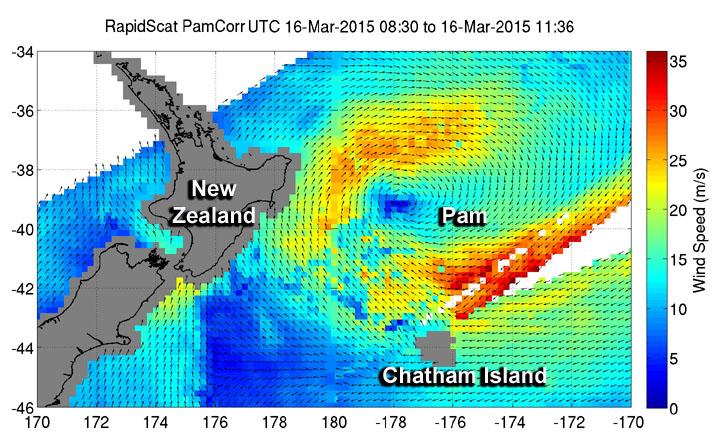RapidScat eyes Ex-Tropical Cyclone Pam's winds near Chatham Islands

RapidScat revealed sustained winds over 30 meters per second/108 kph/67 mph (in red) were still occurring southeast of Pam's center on March 16. Image Credit: NASA JPL/Doug Tyler
The International Space Station's RapidScat instrument captured data on Ex-Tropical Cyclone Pam's winds on March 16 from 08:30 to 11:36 UTC.
RapidScat revealed sustained winds over 30 meters per second (108 kph/67 mph) were still occurring southeast of the center.
The forecast calls for southwesterly winds to 50 knots (57 mph/92 kph) with high seas easing. The “easterly swell 4 meters and southwest swell rising to 7 meters. Poor visibility in heavy rain at times.
On March 17 (or 12:17 a.m. local time, March 18), the New Zealand Meteorlogical Service bulletin stated “Ex Tropical Cyclone Pam lies southeast of the Chatham Islands today, leaving a south to southwest flow over New Zealand.
A ridge moves onto New Zealand on Thursday.” For updated forecasts,visit: http://www.
Media Contact
All latest news from the category: Earth Sciences
Earth Sciences (also referred to as Geosciences), which deals with basic issues surrounding our planet, plays a vital role in the area of energy and raw materials supply.
Earth Sciences comprises subjects such as geology, geography, geological informatics, paleontology, mineralogy, petrography, crystallography, geophysics, geodesy, glaciology, cartography, photogrammetry, meteorology and seismology, early-warning systems, earthquake research and polar research.
Newest articles

Recovering phosphorus from sewage sludge ash
Chemical and heat treatment of sewage sludge can recover phosphorus in a process that could help address the problem of diminishing supplies of phosphorus ores. Valuable supplies of phosphorus could…

Efficient, sustainable and cost-effective hybrid energy storage system for modern power grids
EU project HyFlow: Over three years of research, the consortium of the EU project HyFlow has successfully developed a highly efficient, sustainable, and cost-effective hybrid energy storage system (HESS) that…

After 25 years, researchers uncover genetic cause of rare neurological disease
Some families call it a trial of faith. Others just call it a curse. The progressive neurological disease known as spinocerebellar ataxia 4 (SCA4) is a rare condition, but its…





















